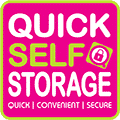16th November 2023
Most businesses have inventories to sustain their operations. The nature of these inventories varies and can be categorised by size, value, perishability, and storage requirements. Self storage is well suited for the storage of certain types of business inventory. Some goods, however, are prohibited for safety purposes.
Most business inventories have specific storage requirements, and these requirements can vary widely within each category. They depend on factors such as temperature, humidity, security, and regulatory compliance. Whether using self storage or not for storage of business inventory, businesses also need to manage their inventory efficiently.
Safety and inventory control are common factors involved in optimising business inventory storage solutions and preventing waste or loss.
Choosing Quick Self Storage with branches in Peterborough, Darlington, and Liverpool for business inventory requirements is a good storage solution for those needing storage in these areas. Here are some tips on how to store business inventory in self storage.
The Types of Business Inventory Self Storage is Suited for 
There is a wide range of categories of business inventory that a self storage unit provides a storage solution for
- Raw materials like lumber, steel, or fabrics may require spacious warehouses or outdoor storage to protect them from the elements. Typically, larger quantities.
- Work-in-progress inventory may be stored in manufacturing areas, workstations, or dedicated storage areas within the facility. This varies depending on the production process.
- Warehouses or distribution centres are commonly used to store finished goods. Storage conditions may vary depending on the product, from dry storage for electronics to climate-regulated for humidity or temperature-sensitive products.
- Maintenance, repair, and operations inventory may include everything from small tools to spare parts and is typically stored in designated maintenance areas or storage rooms within a facility.
- Retail inventory is typically displayed on shelves and stored in backrooms of retail stores. Storage needs vary based on the type of merchandise, with some requiring climate insulation or specialized storage. Various sizes of items, from small to large.
- Small items like screws, bolts, and electronic components. These are typically stored in small parts bins or cabinets within a larger warehouse or maintenance area.
The Types of Business Inventory Self Storage is NOT Suited for
It is important to know the business inventory categories that are prohibited and are not to be stored in self storage. They are as follows:
- Perishable inventory, which includes food, flowers, and other perishables, requires specialised refrigerated storage to maintain product quality and prevent spoilage.
- Bulk inventory, like grains, chemicals, or liquids, is typically stored in silos, tanks, or other bulk storage facilities. This tends to be in large quantities, often in bulk.
- Hazardous materials must be stored in compliance with strict safety regulations, often in specially designed areas with appropriate safety measures. The size of hazardous inventories varies but can include large containers.
- High-value items often need secure storage, such as safes or vaults. Examples include jewellery, expensive electronics, or collectibles.
Self Storage for Business Expansion
Self storage is well suited when a business expands its branches into new areas. A self storage rental helps ensure the smooth operation of the new locations. The following guide will help with that:
- Choose a location that suits the business’s inventory needs. Consider proximity to suppliers, accessibility for customers, and the availability of suitable storage facilities.
- Select the right size self storage unit and plan the layout of the storage space to maximise efficiency.
- Storage facilities have surveillance cameras, access control systems, and alarm systems to protect the inventory from theft and unauthorized access.
- Talk to the storage facility about future storage solutions with scalability in mind. As the business grows, the storage space should be able to accommodate increased inventory. This could involve storage rental of more than one unit.
- Invest in inventory management software to track inventory levels, optimize reordering, and monitor stock movement. This can help prevent overstocking or stockouts.
- Plan the storage layout to implement a first-in, first-out (FIFO) or last-in, first-out (LIFO) inventory rotation system as appropriate for your products. This minimises the risk of obsolescence.
It pays to check out the self storage facility you have in mind before doing the rental. A good relationship between the business and the storage facility will ensure that this important element of the business runs smoothly. It includes having a clear understanding of opening and closing times, loading and offloading logistics, and the size options offered.
Inventory Control Measures for Self Storage
Business owners need to manage their inventory. This can be a challenge, but with the right measures and systems in place to manage inventory remotely Here are some inventory control measures and systems for doing so.
- An inventory management system offers remote access. This allows you to track, manage, and monitor inventory levels and transactions from anywhere with an internet connection.
- Barcoding systems will improve accuracy in inventory tracking. This technology can be managed remotely, making it easier to keep tabs on inventory levels.
- Cloud-based inventory management platforms. These systems allow you to access your inventory data securely over the Internet. Especially useful are real-time updates which can be accessed from various devices.
- Automated reorder systems can generate purchase orders automatically, reducing the risk of stockouts.
- Remote monitoring sensors that provide real-time data on temperature, humidity, and other environmental factors
- Mobile apps that allow staff to perform inventory counts, receive shipments, and make adjustments remotely using smartphones or tablets.
- Regular remote inventory audits to verify the accuracy of your records. These can be done by your team or by third-party auditors.
Quick Self Storage is the First Choice
Self storage facilities implement strict access control and authentication measures to ensure that only authorised personnel can access remote inventory.
For further information and assistance about our storage units in Peterborough, please contact us on 01733 834183 or visit Self Storage Peterborough
For further information and assistance about our storage units in Darlington, please contact us on 01325 489562 or visit Self Storage Darlington
For further information and assistance about our storage units in Liverpool, please contact us on 0151 8324000 or visit Self Storage Liverpool
We hope to see you soon!
Read some of our reviews to see what our customer have to say.




